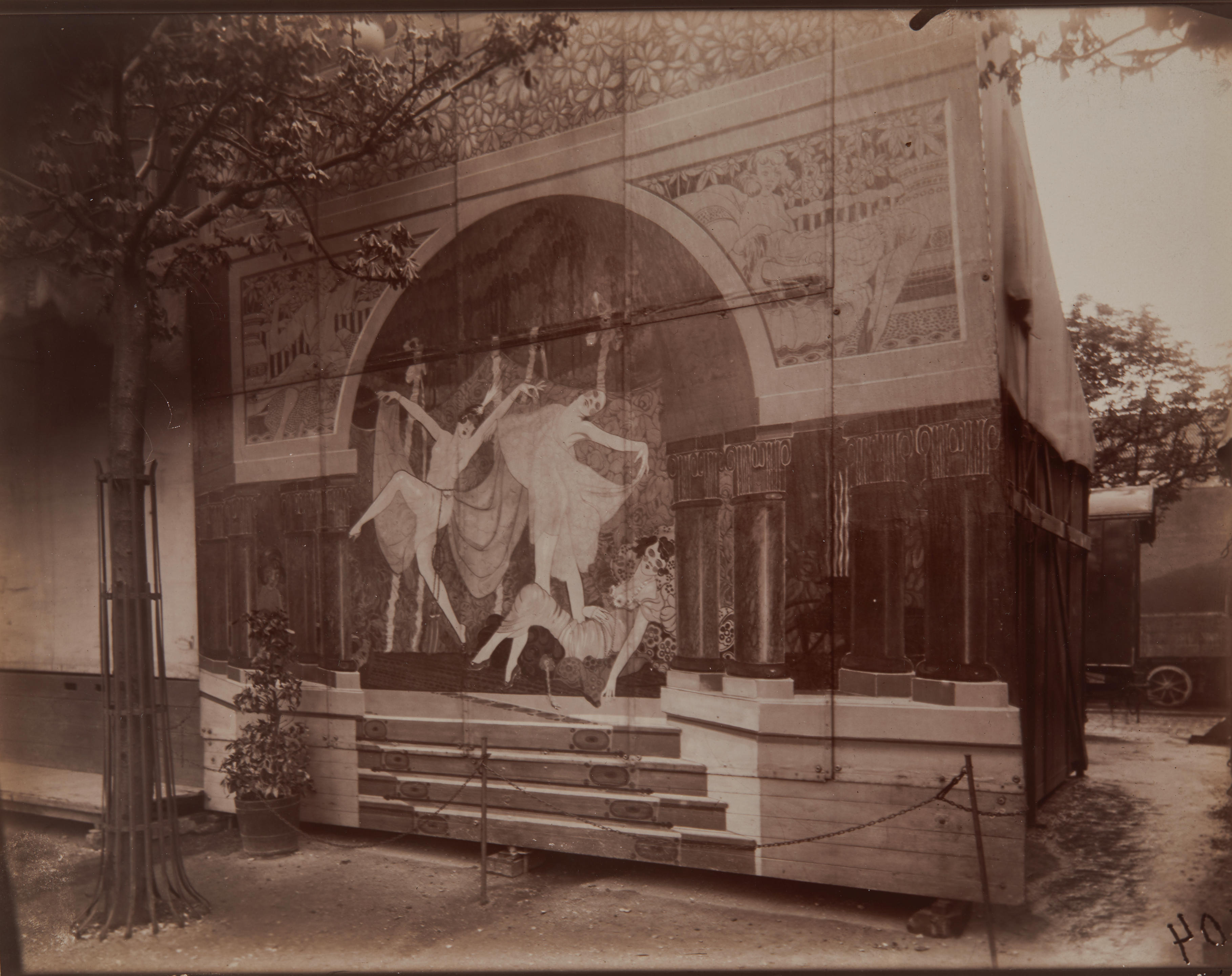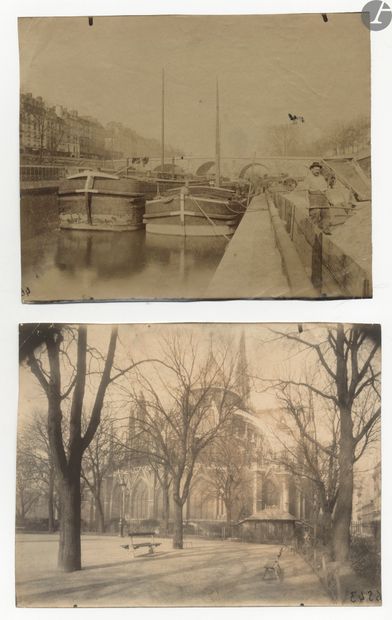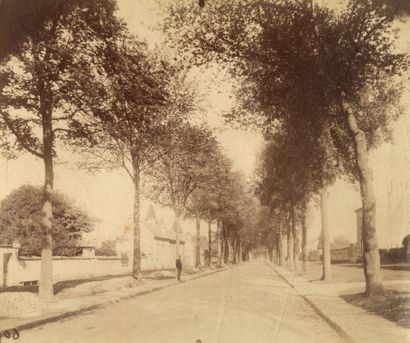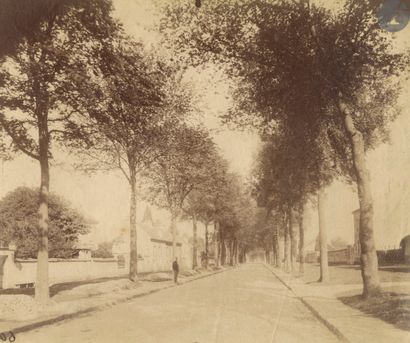Eugène Atget Follow Rue Mouffetard 1925 Printing-out-paper print. 6 7/8 x 8 3/4 in. (17.5 x 22.2 cm) Titled, numbered '94' in pencil and 'Rue Campagne-Première' studio stamp annotated '17 bis' in pencil on the verso.
Provenance Daniel Wolf, Inc., New York Collection of Dr. David J. Weber Christie's, New York, 8 April 1998, lot 220 Catalogue Essay Eugene Atget documented the city of Paris with an objective clarity that remained consistent throughout his career. His work was a continuation of, and an expansion upon, Charles Marville’s earlier survey of the city. But unlike Marville, who was commissioned by the city, Atget undertook this project on his own, his only stated objective being to create “ documents pour artistes. ” Atget’s work extended well into the twentieth century, and Rue Mouffetard , taken in 1925, portrays a distinctly modern street scene. With its lighted shop signs, delivery carts, and clothing displays, this photograph is exemplary of Atget’s unique ability to document a specific place and time. Yet, the photograph’s headless mannequins, garments that seem to float above the shop entrance, and ghostly blurred trails of passing shoppers are examples of the elements that made Atget so appealing to the Surrealists, who found in his work evidence of the ineffable strangeness of everyday life. From his studio on the Rue Campagne-Première Atget sold his photographs inexpensively to the few who would buy them. Among the few was his neighbor, Man Ray, who befriended the older photographer and arranged for his images to be reproduced in the journal La Révolution Surréaliste in 1927. Atget’s work was essentially unknown at the time, and it is one of the ironies of photographic history that this photographer, whose work was firmly rooted in the succinct documentation of the visible world, would be embraced and promoted by the dream-obsessed Surrealists. The Surrealist writer and artist Albert Valentin wrote that Atget’s photographs opened “the way to that extraordinary cerebral landscape which has compelled our attention and which maintains an equilibrium between fact and dream” (‘Eugène Atget, 1856-1927,’ Variétés , December 1928, pp. 403-7). It was through Man Ray that Atget was introduced to the photographer Berenice Abbott who worked at the time as Man Ray’s darkroom assistant, and to the pioneering gallerist and champion of the Surrealists, Julien Levy. After Atget’s death, it was Abbott and Levy who purchased the thousands of photographs and glass negatives left in his apartment, saving the work from likely destruction. Levy devotes a chapter to Atget in his Memoir of an Art Gallery (New York, 1977), one of the few first-person accounts of this prolific but reclusive figure. Levy wrote: “He told me he was simply preserving carefully the vanishing world that he loved, and keeping an archive of important classified documents. He was a remarkably simple man, extremely modest. In truth, he was unaware of his achievement. He left 10,000 photographs in hundreds of series, but each individual picture was an essential pearl in the string that was his Paris. And he was making a new statement with every picture, transcending the document and creating poetry that outlived his Paris and will outlive us all.” Read More
Eugène Atget Follow Rue Mouffetard 1925 Printing-out-paper print. 6 7/8 x 8 3/4 in. (17.5 x 22.2 cm) Titled, numbered '94' in pencil and 'Rue Campagne-Première' studio stamp annotated '17 bis' in pencil on the verso.
Provenance Daniel Wolf, Inc., New York Collection of Dr. David J. Weber Christie's, New York, 8 April 1998, lot 220 Catalogue Essay Eugene Atget documented the city of Paris with an objective clarity that remained consistent throughout his career. His work was a continuation of, and an expansion upon, Charles Marville’s earlier survey of the city. But unlike Marville, who was commissioned by the city, Atget undertook this project on his own, his only stated objective being to create “ documents pour artistes. ” Atget’s work extended well into the twentieth century, and Rue Mouffetard , taken in 1925, portrays a distinctly modern street scene. With its lighted shop signs, delivery carts, and clothing displays, this photograph is exemplary of Atget’s unique ability to document a specific place and time. Yet, the photograph’s headless mannequins, garments that seem to float above the shop entrance, and ghostly blurred trails of passing shoppers are examples of the elements that made Atget so appealing to the Surrealists, who found in his work evidence of the ineffable strangeness of everyday life. From his studio on the Rue Campagne-Première Atget sold his photographs inexpensively to the few who would buy them. Among the few was his neighbor, Man Ray, who befriended the older photographer and arranged for his images to be reproduced in the journal La Révolution Surréaliste in 1927. Atget’s work was essentially unknown at the time, and it is one of the ironies of photographic history that this photographer, whose work was firmly rooted in the succinct documentation of the visible world, would be embraced and promoted by the dream-obsessed Surrealists. The Surrealist writer and artist Albert Valentin wrote that Atget’s photographs opened “the way to that extraordinary cerebral landscape which has compelled our attention and which maintains an equilibrium between fact and dream” (‘Eugène Atget, 1856-1927,’ Variétés , December 1928, pp. 403-7). It was through Man Ray that Atget was introduced to the photographer Berenice Abbott who worked at the time as Man Ray’s darkroom assistant, and to the pioneering gallerist and champion of the Surrealists, Julien Levy. After Atget’s death, it was Abbott and Levy who purchased the thousands of photographs and glass negatives left in his apartment, saving the work from likely destruction. Levy devotes a chapter to Atget in his Memoir of an Art Gallery (New York, 1977), one of the few first-person accounts of this prolific but reclusive figure. Levy wrote: “He told me he was simply preserving carefully the vanishing world that he loved, and keeping an archive of important classified documents. He was a remarkably simple man, extremely modest. In truth, he was unaware of his achievement. He left 10,000 photographs in hundreds of series, but each individual picture was an essential pearl in the string that was his Paris. And he was making a new statement with every picture, transcending the document and creating poetry that outlived his Paris and will outlive us all.” Read More














Try LotSearch and its premium features for 7 days - without any costs!
Be notified automatically about new items in upcoming auctions.
Create an alert